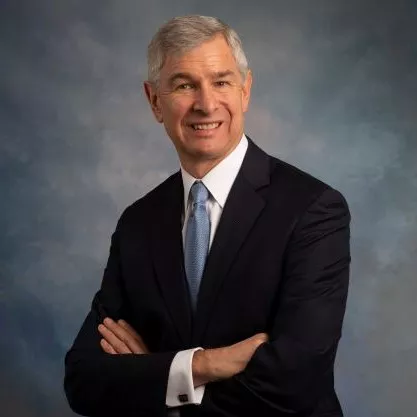University Day is Oregon State University's celebratory launch to the academic year. During this event, the university welcomes new employees, celebrates excellent work, and recognizes awards for teaching, mentoring, engagement, and research. Part of this event is the University Day Lecture, delivered by a distinguished leader, thinker, or scholar who inspires faculty and staff to reflect on their roles as educators committed to delivering OSU's land grant research university mission.
2024 UNIVERSITY DAY LECTURE
SAVE THE DATE: TUESDAY, SEPTEMBER 17
10:30 a.m. | PRAx
Event details and registration forthcoming.

MARK BECKER | President, Association of Public & Land Grant Universities
Mark Becker will be the 2024 University Day keynote speaker. Becker is President of the Association of Public & Land-Grant Universities (APLU), a research, policy, and advocacy organization dedicated to strengthening and advancing the work of public universities in the U.S., Canada, and Mexico. The association's membership consists of more than 250 public research universities, land-grant institutions, state university systems, and affiliated organizations.
From January 2009 to August 2021, he was the seventh president of Georgia State University. Becker led the transformation of Georgia State from a formerly little known “commuter school” into one of the nation’s premier urban research universities. The university more than doubled sponsored research funding during his tenure, and GSU became a widely recognized national leader in the introduction of innovative programs and initiatives to foster student success. Georgia State University has been consistently ranked as one of the three most innovative universities in the country by U.S. News & World Report magazine.
Prior to Georgia State, Becker held academic appointments at the University of Florida, University of Washington, University of Michigan, and leadership positions at the University of Minnesota and University of South Carolina.
Becker has received numerous awards and recognitions, including being named one of America’s 10 most innovative university presidents by Washington Monthly in 2015, the Academic Leadership Award from the Carnegie Corporation of New York in 2017, and the Hesburgh Award for Leadership Excellence in Higher Education from TIAA Institute in 2019.
2023

Marcia McNutt, Ph.D.
President, National Academy of Sciences
2022

Ruth V. Watkins, Ph.D.
President, Strada Impact
2021

Dr. Holden Thorp
Editor-In-Chief of Science
2020

Dr. Freeman A. Hrabowski
President, University of Maryland, Baltimore County
2019

Dr. Diana Natalicio
President Emerita, University of Texas at El Paso
2018

Michelle Kuo
Author, Reading with Patrick
2017

Harry Boyte
Senior Scholar in Public Work Philosophy, Augsburg College
2016

Dr. Carmen Suarez
Vice President for Global Diversity and Inclusion, Portland State University
2015

Brandon Busteed
Executive Director, Gallup Education
2014

Jeff Selingo
Author, There Is Life After College
2013

Dr. Caryn McTighe Musil
Distinguished Fellow, Association of American Colleges and Universities
2011

Kevin Fitzgerald
Veterinarian
2010

Dr. Jillian Kinzie
Associate Director, Center for Postsecondary Research